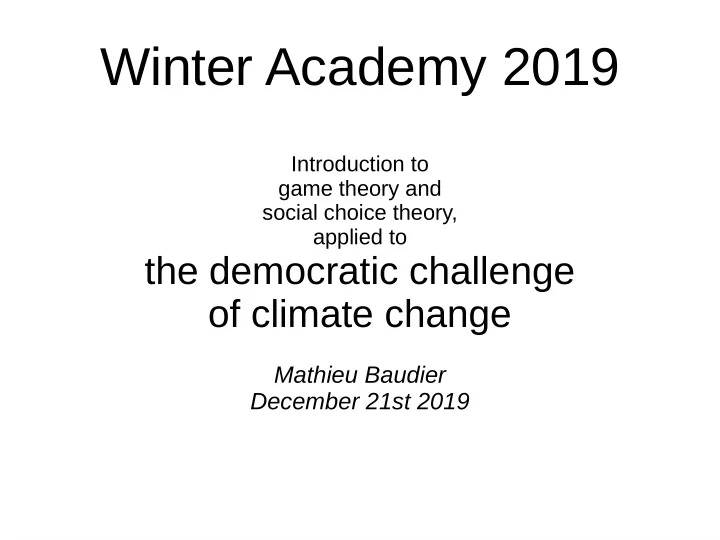

Winter Academy 2019 Introduction to game theory and social choice theory, applied to the democratic challenge of climate change Mathieu Baudier December 21st 2019
Plan ● Concepts ● The social dilemma ● Preferences aggregation ● Role game
The approach ● Political actors – Citizens – Politicians – Civil servants – Interest groups / lobbies ● are rational and self-interested
Why is it useful? ● We leave aside the common good and the general interest (temporarily!) and focus on group dynamics ● The goal of this presentation – Add perspectives on the challenge of climate change – Applicable to (many) other settings
These are just models! ● Positive analysis: what happens in reality ● Normative analysis: what should happen ● Understanding these dynamics help to further our work for the common good
Public good vs. commons ● Public good – Non-excludable – Non-rivalrous – Must be provided by the state (defence, maintenance of historical monuments, etc.) ● Common good – Non-excludable – Rivalrous – Tragedy of the commons
Externalities and incentives ● Positive externalities – Education, clustering of companies, biodiversity of non-intensive agriculture, etc. ● Negative externalities – Pollution, traffic congestion, some farming ● Market failure – The State must intervene with incentives and disincentives
Winners and losers ● In trade policy as in environmental policy we consider countries, but the effects varies within them ● Anecdote: what they think in my village in Brandenburg
Framing the debate ● If we consider only carbon emissions, France is great thanks to nuclear energy, but it also pollutes ● Germany are environmentalists for a long time, but their carbon emissions are huge, because of coal ● The genius of the Paris targets
Consumed carbon ● Focus of global climate policy has mostly been on reducing carbon production ● But carbon consumption create harmful incentives: outsource dirty industries to porrer, authoritarian countries ● Carbon pollution also harms locally
Concepts: wrap-up ● Characteristics of the climate issue – Global negative externalities – Tragedy of the commons – No world state to deal with it ● From a democratic point of view – Mitigation impacts people differently – It is easy to just look nice
Plan ● Concepts ● The social dilemma ● Preferences aggregation ● Role game
The chicken game ● Two cars drive towards each other, the first who blink has lost ● Risk: both dies ● Simple explanation why some negotiations fail ● One way is to remove the wheel: with less choice one can be more convincing
The Prisoner dilemma ● Original way to present, but not necessarily the clearest ● What is best for both actors does not lead to the best general outcome
Prisoner dilemma Source: David Mond, University of Warwick
Cartels Source: David Mond, University of Warwick
Climate change No one has an incentive to cooperate! Source: Vann Newkirk, The Atlantic
Stag hunt Near complete collapse, one has an incentive Source: Vann Newkirk, The Atlantic
More complex games ● Repetitive games: incentives to cooperate tend to augment (e.g. COP) ● Tit-for-tat strategy tends to be optimal: we’ll do what you have done the previous time ● Coalitions, multi-stage negociations
Plan ● Concepts ● The social dilemma ● Preferences aggregation ● Role game
Impossibility theorem ● Arrows impossibility theorem: under certain axioms, it is impossible to properly aggregate the preferences of a group ● There is no such thing as a people “will”
Voting systems ● Each voting system has its flaws – French election 2007 – German proportional system – Silent consensus at EU level ● Consensus is the most legitimate, but the harder to reach ● Preferential voting (video)
Conclusion ● Institutions and rules matter – Some situations are structurally harmful – Deciding as a group is difficult ● Back to values and advocacy ● The risk of violence ● Hope: we have already dealt with environmental emergencies
Plan ● Concepts ● The social dilemma ● Preferences aggregation ● Role game
Recommend
More recommend